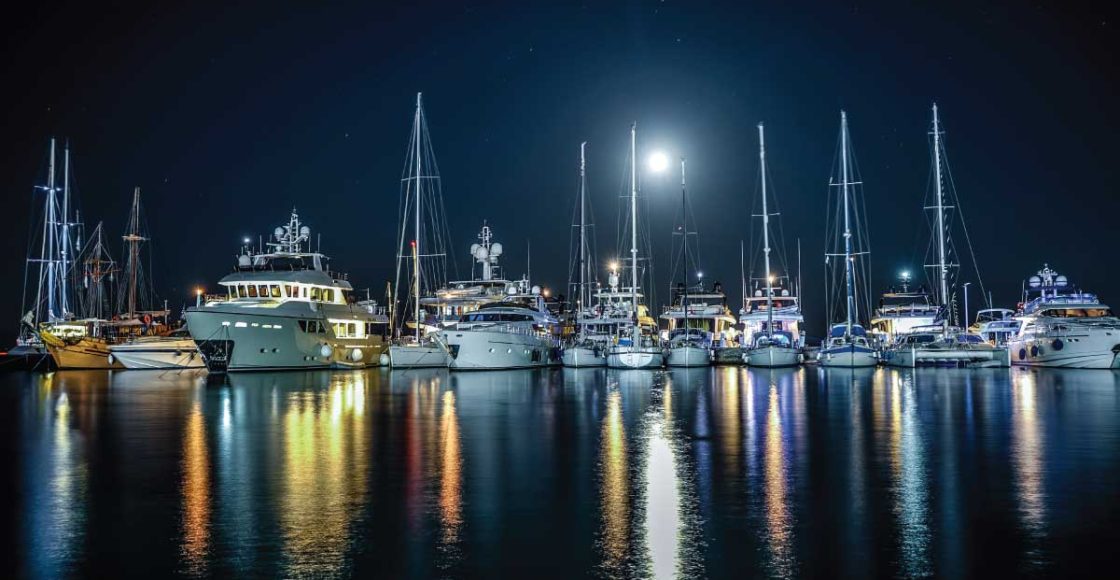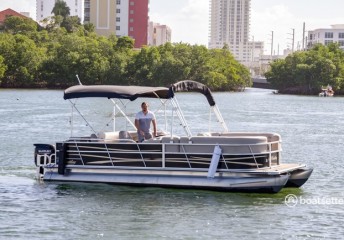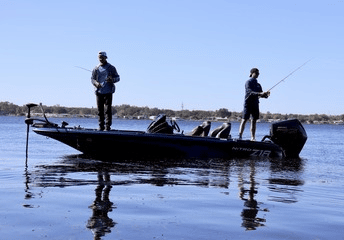Sleeping on a Boat Overnight: 3 Options to Consider
Last Updated on July 8, 2022 by Boatsetter Team
Part of boating is going out on extended adventures, some of which may last longer than one day and that means you’ll need to sleep aboard. Sleeping overnight on a boat can be a very peaceful experience and sometimes an exciting one. Preparation and expectation management are key.
Depending on the kind of boat you’re on, sleeping on a boat overnight can be like camping or it can be very posh with all available amenities just like in a small apartment. For example, on a pontoon boat, you may be in a sleeping bag under the stars; while on a yacht, you may have an air-conditioned cabin with a full berth (bed), linens, and a head (bathroom) in your suite.
Besides the type of boat, another element to consider is what location to stay overnight. We’ve boiled down our list to three spots you’ll want to park your vessel:
- A dock (or sandbar)
- Anchor
- Offshore
Let’s take a broader look at these three locations to spend overnight on a boat.
Already Own a Boat? Earn an Average of $20K/season by Renting it Out on Boatsetter
At a dock or sandbar
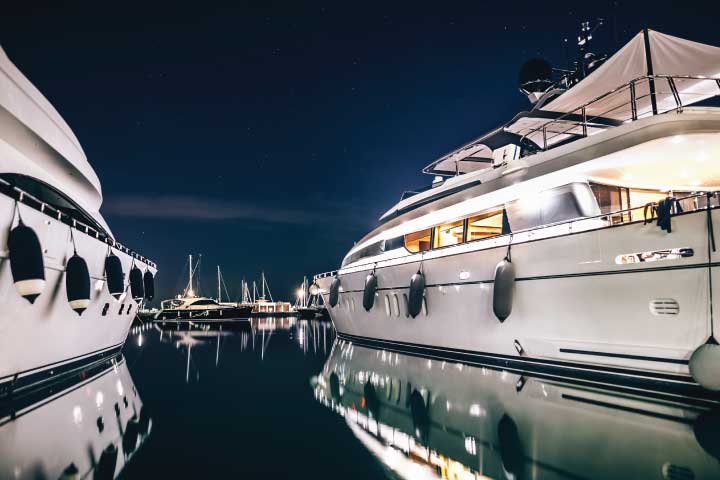
If you’re at a dock, the boat will most likely be steady, making sleep fairly easy. On a sailboat or motor yacht, you’ll be inside so you’ll be warm and dry.
On the other hand, if the boat is small and is pulled up on a sandbar or shore, you may be sleeping outside which means you’ll need to prepare for weather (rain, dew, heat) and for bugs (mosquitos). Temperatures on the water can be cooler even in summer so plan for extra clothing or blankets.
Before falling asleep, consider the following factors:
- Where and how you can use facilities in the middle of the night
- Have a flashlight nearby
- Sounds may include the creaking or movement of the boat, insects, frogs, small waves, or nearby boating neighbors
- For boats kept in saltwater, you may hear a crunching sound which is shrimp feeding on the growth on the hull
Overall, sleeping aboard or under the stars can be very relaxing so long as you’re physically comfortable and not anxious.
Sleeping on a boat at anchor
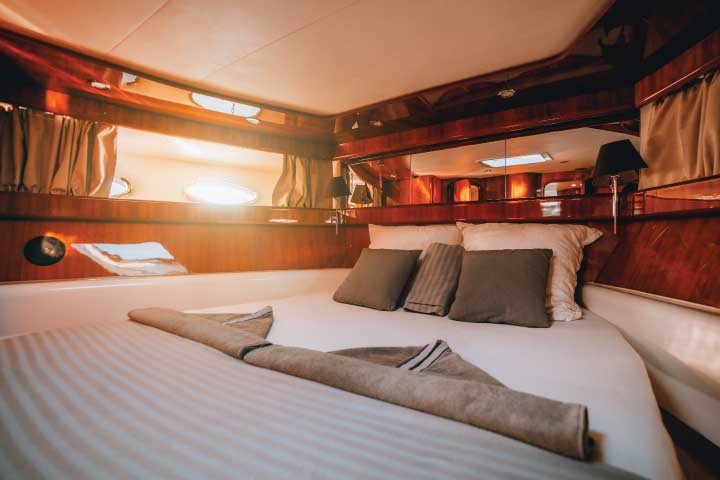
Sleeping on a boat that’s anchored in a remote cove can be magical. Gentle rocking has a calming effect on most people. The key to feeling secure is anchoring correctly which means out of the way of boat traffic channels, away from hazards such as shallow water, rocks or docks, and in secure holding ground.
- Have enough scope (ratio of anchor line to water depth) to keep the anchor in place without dragging. Aim to set the anchor with a scope of 5-7x line to 1x depth.
- Don’t forget anchoring etiquette: including leaving a safe distance from other vessels already anchored, keeping a quiet boat, and not running a generator after 10:00 pm or before 7:00 am.
Again, comfort will depend on the type of boat and its amenities.
Anchor anxiety—if it’s holding or not—may arise if there is changing wind or current, poor holding ground, or inclement weather that could cause the anchor to fail and drag. In this case, you may have to set an anchor watch where one person sits awake and monitors the conditions while others sleep. Setting 1-2-hour anchor watches can be done if there are multiple people aboard.
If the anchor is secure, the weather is good and the bed is comfortable, most people comment on how well they sleep aboard.
Sleeping aboard while offshore

When long-distance cruising, you’ll be moving a boat between two distant points that you may not be able to reach within daylight hours. That means someone will be in charge of the boat underway while others sleep.
Distance cruising sailboats often sail through multiple nights to reach their destination with the crew taking turns running the boat or sleeping/cooking/relaxing. Rotating watches can be tiring, so try to rest as soon as you are off watch.
Singlehanded sailors (sailing alone) tend to sleep in increments of 20-30 minutes at a time and set alarms to wake them so they can scan the horizon and check on the boat before returning to dozing.
It’s important to stay put while sleeping on a moving vessel. Sailboats tack so you may need a berth with a lee cloth that keeps you tucked in regardless of the direction changes or angle of the heel of the boat. In rough seas, even powerboats can jostle their sleeping guests, so secure yourself the best you can with pillows or blankets and be careful when getting up at night.
Ready to sleep on a boat overnight?
Before falling asleep on any boat in any situation, be sure to secure all loose gear, even things like trash bags and books that may go overboard, or things that will roll noisily all night. This will make you crazy because boats are notorious sound amplifiers.
If you have kids or pets aboard, make sure their mobility is restricted so they can’t fall overboard or get hurt by onboard equipment while you’re asleep.
The rewards of sleeping onboard are usually a gentle rocking motion, beautiful phosphorescence around you or in your wake, and maybe even the whoosh of dolphins swimming by. With proper preparation, you don’t have to rough it or even feel like you’re camping, and it can be a very special experience that you’ll want to repeat.
Explore All Available Boats for Rent Across the U.S.

Zuzana Prochazka is an award-winning freelance journalist and photographer with regular contributions to more than a dozen sailing and powerboating magazines and online publications including Southern Boating, SEA, Latitudes & Attitudes and SAIL. She is SAIL magazines Charter Editor and the Executive Director of Boating Writers International. Zuzana serves as judge for SAIL’s Best Boats awards and for Europe’s Best of Boats in Berlin.
A USCG 100 Ton Master, Zuzana founded and manages a flotilla charter organization called Zescapes that takes guests adventure sailing at destinations worldwide.
Zuzana has lived in Europe, Africa and the United States and has traveled extensively in South America, the islands of the South Pacific and Mexico.
